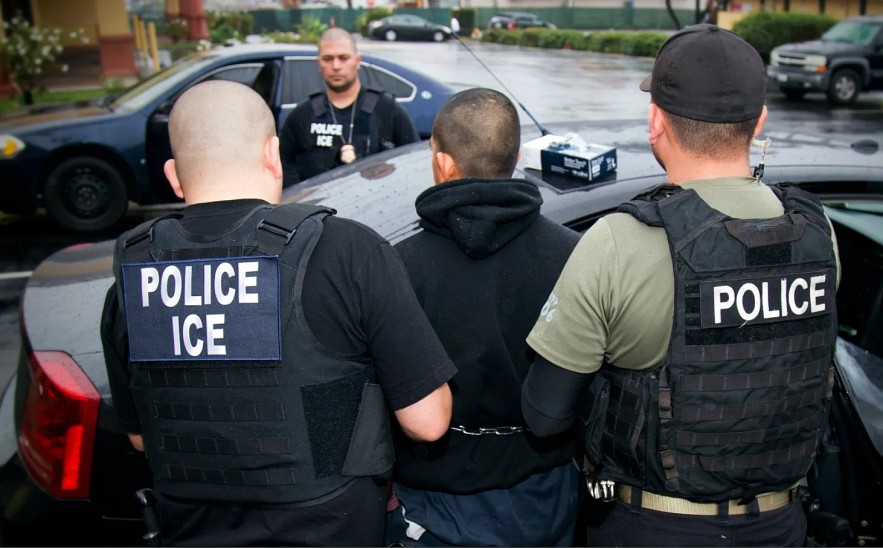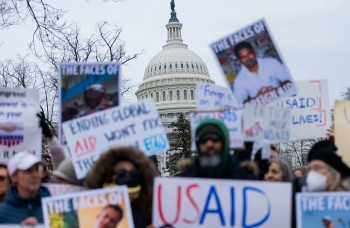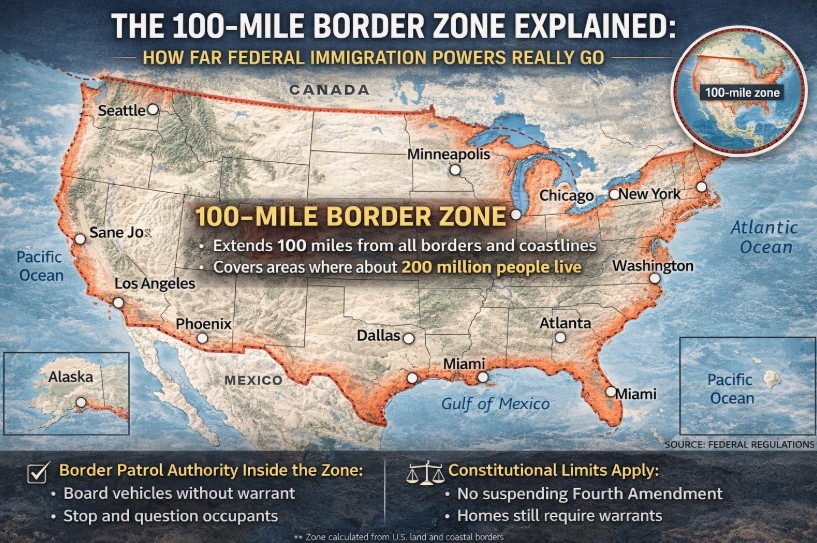What are the Rights of Immigrants in the U.S?
The issue of immigration enforcement by Immigration and Customs Enforcement (ICE) has
The issue of immigration enforcement by Immigration and Customs Enforcement (ICE) has garnered significant attention, especially with the recent surge in detentions and deportations. Over the past month, ICE has detained more than 275,000 individuals, with at least 15,000 deportations. The majority of those affected come from Central and South America, but data also indicates a significant number of detainees are from India, China, and Russia. Moreover, ICE has been ordered to detain between 1,800 to 2,000 people daily, an increase from previous quotas.
In response to this situation, the Ethnic Media Services (EMS) organized a seminar on Friday, February 7, to educate immigrants on how they can protect themselves from ICE enforcement actions. Several speakers at the event shared crucial information about immigrant rights and strategies to safeguard themselves when confronted by ICE at home or work.
 |
| Understanding the Rights of Immigrants |
The Rights of Immigrants
1. Legal Protections When Confronted by ICE
Amanda Alvarado-Ford, an immigration attorney from the San Francisco Bay Area Immigration Institute, emphasized that undocumented immigrants in the U.S. have constitutional rights, just like citizens. Some key protections include:
-
The Right to Remain Silent: If detained by ICE, immigrants have the right to refuse to answer questions and should explicitly state that they wish to exercise this right.
-
Protection from Unlawful Searches and Arrests: ICE officers must have a warrant signed by a judge to enter a home. It is crucial for individuals to ask for proper documentation before allowing officers inside.
-
Right to Legal Counsel: Detainees have the right to request an attorney and should avoid signing any documents without legal consultation.
Alvarado-Ford advised immigrants to keep their immigration documents accessible and to familiarize themselves with what constitutes a valid court warrant.
2. Conditions in Detention Centers
Maru Mora-Villalpando, an immigration activist and founder of La Resistencia in Tacoma, Washington, discussed the dire conditions in immigration detention facilities. Many detainees experience:
-
Poor-quality food
-
Lack of clean clothing
-
Inadequate medical care
-
Unhygienic living conditions
These conditions have led to numerous hunger strikes, with 22 protests recorded in 2025 alone. Additionally, outbreaks of diseases such as chickenpox, COVID-19, and tuberculosis have been reported in detention centers, and five detainees held in solitary confinement died in late 2024. Despite promises from ICE to improve conditions, these issues persist, and detainees who protest are often subjected to solitary confinement, relocation, or expedited deportation.
3. The Impact on Schools and Students
Viridiana Carriazales, founder of ImmSchools and a former undocumented immigrant, highlighted the growing fear among students due to ICE’s presence near educational institutions. She noted that approximately 6 million students in the K-12 education system are either undocumented or have undocumented parents. To address this, she emphasized several key rights:
-
Right to Education: Under the 1982 Plyler v. Doe Supreme Court ruling, all children in the U.S. have the right to a K-12 education regardless of their immigration status.
-
Protection of Student Records: Schools are not permitted to inquire about a student’s immigration status, and under the Family Educational Rights and Privacy Act (FERPA), student records are protected from unauthorized disclosure.
Carriazales encouraged parents to continue sending their children to school despite fears of enforcement actions, emphasizing the importance of education for their future.
Legal Challenges Against Immigration Policies
Oscar Sarabia Roman, an immigration attorney with the American Civil Liberties Union (ACLU), discussed ongoing legal battles against several recent immigration enforcement orders:
-
Increased Detention and Deportation Quotas: ACLU has filed a lawsuit challenging the policy requiring ICE to meet a daily arrest target of 1,800-2,000 individuals.
-
Restricting Asylum Seekers: ACLU continues to contest policies that severely limit the ability of asylum seekers to apply for protection in the U.S.
-
Expedited Deportation Procedures: A lawsuit is also underway against the policy of accelerating deportations for individuals unable to prove they have lived in the U.S. for two years.
Roman emphasized that despite strict enforcement policies, constitutional rights still apply, and immigrants should assert their legal protections when dealing with law enforcement.
Final Recommendations for Immigrants
The seminar provided essential takeaways for immigrants to safeguard themselves:
-
Know and exercise your rights.
-
Keep important documents accessible.
-
Demand to see a judicial warrant before allowing ICE officers entry.
-
Remain silent and request legal representation if detained.
-
Encourage children to continue their education and be aware of school-related protections.
As immigration enforcement continues to escalate, knowledge and preparedness are key in protecting one’s rights and ensuring a fair legal process. Immigrant advocacy groups and legal organizations continue to work towards improving conditions and protecting the dignity of those affected.
 Donald Trump's New Education Policies: Backing School Choice and Empowering Parents Donald Trump's New Education Policies: Backing School Choice and Empowering Parents President Donald Trump signed a sweeping executive order aimed at expanding school choice and strengthening parents' role in their children’s education. |
 How Many Employees Are in the Federal Workforce in the U.S? How Many Employees Are in the Federal Workforce in the U.S? Millions of federal employees in the U.S. are facing President Trump's deadline: either resign with eight months of pay or return to the office for ... |
 Could Prince Harry Be Deported from the U.S. for Lying on His Visa Application? Could Prince Harry Be Deported from the U.S. for Lying on His Visa Application? Prince Harry, Duke of Sussex, is facing renewed scrutiny regarding his U.S. immigration status following the re-election of Donald Trump as President of the United ... |
 Blood Money or Justice? Luigi Mangione Accepts $300K from Supporters for Legal Defense Blood Money or Justice? Luigi Mangione Accepts $300K from Supporters for Legal Defense In a case that has garnered national attention, Luigi Mangione, accused of murdering UnitedHealthcare CEO Brian Thompson, has accepted approximately $300,000 in donations from supporters ... |


























